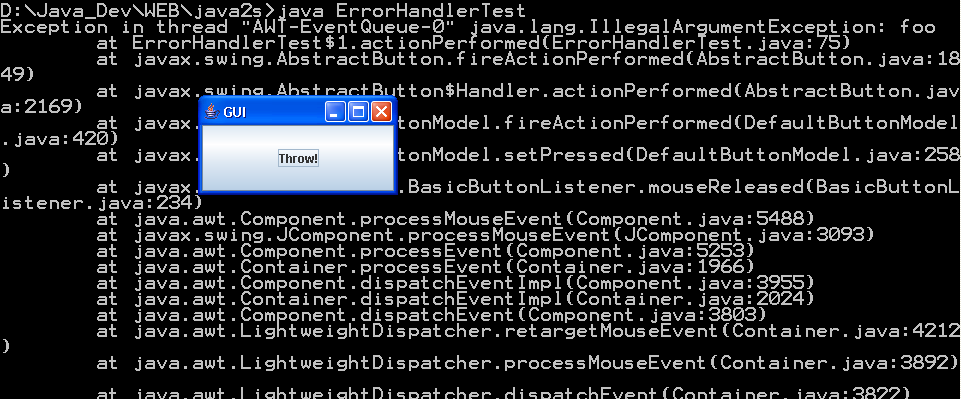Error Handler

/*
* Copyright (c) Ian F. Darwin, http://www.darwinsys.com/, 1996-2002.
* All rights reserved. Software written by Ian F. Darwin and others.
* $Id: LICENSE,v 1.8 2004/02/09 03:33:38 ian Exp $
*
* Redistribution and use in source and binary forms, with or without
* modification, are permitted provided that the following conditions
* are met:
* 1. Redistributions of source code must retain the above copyright
* notice, this list of conditions and the following disclaimer.
* 2. Redistributions in binary form must reproduce the above copyright
* notice, this list of conditions and the following disclaimer in the
* documentation and/or other materials provided with the distribution.
*
* THIS SOFTWARE IS PROVIDED BY THE AUTHOR AND CONTRIBUTORS ``AS IS''
* AND ANY EXPRESS OR IMPLIED WARRANTIES, INCLUDING, BUT NOT LIMITED
* TO, THE IMPLIED WARRANTIES OF MERCHANTABILITY AND FITNESS FOR A PARTICULAR
* PURPOSE ARE DISCLAIMED. IN NO EVENT SHALL THE AUTHOR OR CONTRIBUTORS
* BE LIABLE FOR ANY DIRECT, INDIRECT, INCIDENTAL, SPECIAL, EXEMPLARY, OR
* CONSEQUENTIAL DAMAGES (INCLUDING, BUT NOT LIMITED TO, PROCUREMENT OF
* SUBSTITUTE GOODS OR SERVICES; LOSS OF USE, DATA, OR PROFITS; OR BUSINESS
* INTERRUPTION) HOWEVER CAUSED AND ON ANY THEORY OF LIABILITY, WHETHER IN
* CONTRACT, STRICT LIABILITY, OR TORT (INCLUDING NEGLIGENCE OR OTHERWISE)
* ARISING IN ANY WAY OUT OF THE USE OF THIS SOFTWARE, EVEN IF ADVISED OF THE
* POSSIBILITY OF SUCH DAMAGE.
*
* Java, the Duke mascot, and all variants of Sun's Java "steaming coffee
* cup" logo are trademarks of Sun Microsystems. Sun's, and James Gosling's,
* pioneering role in inventing and promulgating (and standardizing) the Java
* language and environment is gratefully acknowledged.
*
* The pioneering role of Dennis Ritchie and Bjarne Stroustrup, of AT&T, for
* inventing predecessor languages C and C++ is also gratefully acknowledged.
*/
import java.awt.Container;
import java.awt.event.ActionEvent;
import java.awt.event.ActionListener;
import javax.swing.JButton;
import javax.swing.JFrame;
/**
* Contrived program showing how to catch Exceptions that occur on the event
* dispatching thread. Define the System property "sun.awt.exception.handler" to
* name a class with a method
*
* <pre>
*
* public void handle(Throwable t)
*
* </pre>.
* <p>
* That really is all you have to do to catch GUI Exceptions. But it may change
* at any time (hence the name sun.awt...).
*
* @author Ian Darwin.
*/
public class ErrorHandlerTest extends JFrame {
/**
* A fairly banal GUI, just to show interaction.
*/
ErrorHandlerTest() {
super("GUI");
setDefaultCloseOperation(JFrame.EXIT_ON_CLOSE);
Container cp = getContentPane();
JButton bx = new JButton("Throw!");
bx.addActionListener(new ActionListener() {
public void actionPerformed(ActionEvent evt) {
throw new IllegalArgumentException("foo");
}
});
cp.add(bx);
setBounds(200, 200, 200, 100);
}
public static void main(String[] args) {
// Tell AWT to invoke my Handler.
System.setProperty("sun.awt.exception.handler", "ErrorHandler");
// Now create and show the GUI.
new ErrorHandlerTest().setVisible(true);
}
}
/**
* This class is usable by AWT to handle exceptions.
* System.setProperty("sun.awt.exception.handler", "ErrorHandler"); This usage
* is documented in the source code up to 1.4Beta for
* java.awt.EventDispatchThread. This class exists in all standard
* implementations (try "javap java.awt.EventQueueDispatchThread"), but is not
* public so there's no javadoc. NOTE: there is a strong admonition that the
* interface WILL be changed in future.
* <p>
* In real life this could be part of your application, and can do almost
* anything. The error handler itself does not need to import awt, awt.event,
* swing, or anything else.
*
* @author Ian Darwin
* @version $Id: ErrorHandler.java,v 1.4 2003/08/24 12:31:03 ian Exp $
*/
class ErrorHandler extends java.lang.Object {
/**
* Default constructor must exist (I know it's the default; this is here in
* case somebody adds any other constructor).
*/
public ErrorHandler() {
System.out.println("CONSTRUCTED");
}
public void handle(Throwable t) {
System.err.println("Hey, I caught it!");
System.err.println(t.toString());
}
}
Related examples in the same category